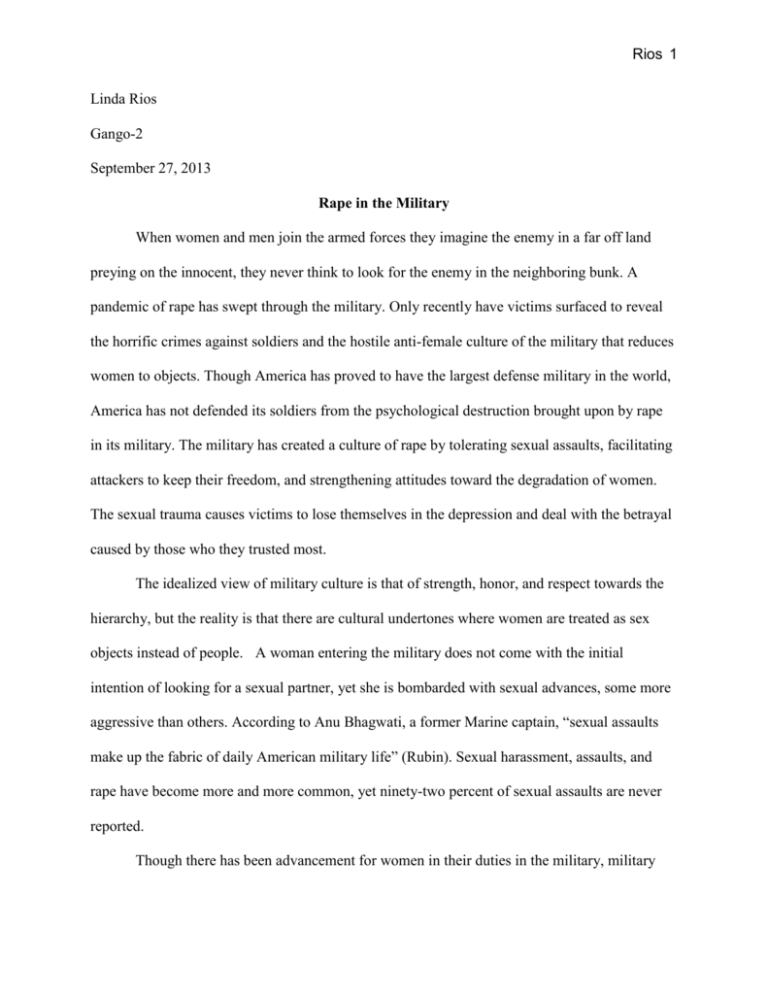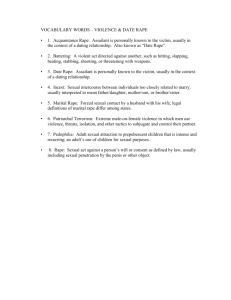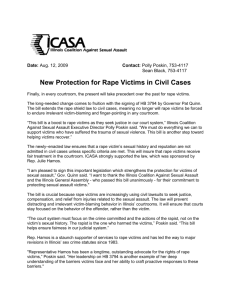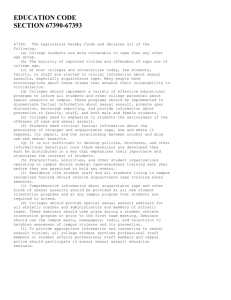
Rios 1
Linda Rios
Gango-2
September 27, 2013
Rape in the Military
When women and men join the armed forces they imagine the enemy in a far off land
preying on the innocent, they never think to look for the enemy in the neighboring bunk. A
pandemic of rape has swept through the military. Only recently have victims surfaced to reveal
the horrific crimes against soldiers and the hostile anti-female culture of the military that reduces
women to objects. Though America has proved to have the largest defense military in the world,
America has not defended its soldiers from the psychological destruction brought upon by rape
in its military. The military has created a culture of rape by tolerating sexual assaults, facilitating
attackers to keep their freedom, and strengthening attitudes toward the degradation of women.
The sexual trauma causes victims to lose themselves in the depression and deal with the betrayal
caused by those who they trusted most.
The idealized view of military culture is that of strength, honor, and respect towards the
hierarchy, but the reality is that there are cultural undertones where women are treated as sex
objects instead of people. A woman entering the military does not come with the initial
intention of looking for a sexual partner, yet she is bombarded with sexual advances, some more
aggressive than others. According to Anu Bhagwati, a former Marine captain, “sexual assaults
make up the fabric of daily American military life” (Rubin). Sexual harassment, assaults, and
rape have become more and more common, yet ninety-two percent of sexual assaults are never
reported.
Though there has been advancement for women in their duties in the military, military
Rios 2
culture is still very anti-female and alive with stereotypes of women being weak and unable to
fight. Even though American values advocate equality for all, the reality of the military is that
women are treated as inferiors to the male soldier. Sergeant Sarah Scully explained that in the
military “any sign that you are a woman you are automatically ridiculed and treated as inferior”
(Benedict 5). The small proportion of women to men in the military makes it easier for this kind
of treatment to continue. Women are only twelve percent of all active duty forces and often are
put in situations where there is only one woman in a group of thirty to forty men (Wickenden).
Though not all soldiers share the same ideals or beliefs, there are men that “resent women for
usurping the masculine role of a warrior.” Women are then prone to experiencing the military’s
traditional and deep seated hostility toward females (Benedict 5). The male dominated
environment breeds this hostility because there are few women in comparison to all the men to
act as big enough force to go against the overpowering hierarchal rule found within the military
culture. If the proportion of men to women was more equal, the attitudes of women would
counteract the misogynist culture within the military.
Soldiers that do not respect a woman in a position of power can do many things to make
her less than the rank that she earned. They may be hostile toward women, undermine their
authority, deny them promotions, and defame their work. Sometimes it not enough to humiliate a
female soldier in public, some of these misogynistic men go as far as to rape a woman to show
their dominance and power over them. If no one finds out about what they have done, they go
unpunished. If someone does find out, it either still goes unpunished or is punished with a small
slap to the wrist. In some squadrons it is seen as something to be proud of, it builds that soldiers
reputation in front of the whole platoon to see how many they can get under their belt (Benedict
76). The cultural standpoint in the military categorizes women as whores if they have willing
Rios 3
sex with anyone; but if a man is having sex with a woman against her will, he is neither
reprimanded nor defamed.
The men that rape these young women are the victim’s commanding officer or fellow
recruit. A study by the Navy showed that fifteen percent of incoming recruits had tried to
commit rape before entering the military (Invisible War). Both men and women are victims; a
study by the Department of Defense showed that 12,100 women and 13,900 men reported
unwanted sexual contact. There are 1.2 million men in the military, in comparison to 200,000
women serving in the armed forces, rape for women is more scrutinized because there are less
women, thus the proportion of rape and sexual assault is higher for women than men (Childress).
It is a common assumption that men who rape men are homosexual, which could not be further
from the truth: they are almost always heterosexual. Brian Lewis, the very first male rape
survivor to testify before Congress, described it as "It's not about sex. It's about power and
control" (Basu).
The common belief is that military men and women are not the victims of sexual assault
because they are soldiers and they can defend themselves from attackers. What is not readily
understood is that hierarchy in the military affects the soldiers on a much deeper psychological
level. From the moment their foot is in the door, new recruits are taught that their commanding
officer must be respected and obeyed at all times, that they must respect the person that outranks
them and never question their commands. The military does not only instill physical training but
also a mental training, training them to never act against someone who out ranks them, even if in
self defense. A report by the Department of Defense establishes that the majority of sexual
assaults generally involve men who outrank their victims, the majority are women under 25 who
feel that as subordinates they could not fight back (The Invisible War). As was the case of Nicole
Rios 4
McCoy, who was raped in 2012 by her commanding officer; in an interview she was quoted in
saying “Emotionally I felt completely violated and didn't feel I had the right to say no and have
him stop”(Rubin). Rapists are not motivated by desire or lust, but by “a mix of anger, sexual
sadism, and the need to dominate and destroy, this is what is meant by the oft-repeated by little
understood phrase that rape is about power not sex”(Benedict 5).
Rape and threats of murder go hand in hand, victims have been beaten, cut with knives,
and threatened with guns while they were being raped adding the trauma of almost dying.
Sometimes rapists go through with their threats and murder their victims. During the Iraq War,
four female soldiers were found dead due to non-combat related injuries after reporting their
rape, and at least another fifteen women died under the same circumstances. One of the most
appalling cases is that of nineteen year-old LaVena Johnson who died on her base in July of
2005. The state her body was in when she was found was dreadful: “her face was battered and
she had been stripped, raped, burned, reclothed, dragged across the ground bleeding and shot in
the head” (Benedict 7). When the investigation of Johnson started getting closer to a possible
suspect, her squadron leader, the case was mysteriously closed and her death was called suicide.
There was never an investigation long enough for any of these women to find that cause of the so
called “suicides.”
Many trials have led to no or minimal consequences for the rapists, instead it is usually
the victim who is most affected both professionally and socially. The victim is accused of lying
and is treated as a criminal instead of an individual in search of justice. The logic behind this
attitude is to protect the male soldier, protect him because he might be an asset to the squadron or
high up in hierarchal chain. But the reality is that by not investigating the reports, defending and
not prosecuting these sexual predators, more and more soldiers are being raped, both men and
Rios 5
women. A study in 2002, where Navy recruits were granted confidentiality in their responses,
found that “approximately two thirds of men admitted to raping-but never had been caught- more
than once, averaging six rapes each” (Childress).
Research suggests that one in three women in the U.S. military are the victim of sexual
assault. Lance Corporal Nicole McCoy was assaulted so many times that she thought it was
“normal and unavoidable” at only twenty-three years old. Lieutenant Elle Helmer reported her
rape by a well regarded major so promptly, he was still passed out and pantless at the scene of
the crime. She brought higher ranking officers to see the inebriated major unconscious on the
floor, but they turned against her and the rape kit and all other evidence mysteriously
disappeared . As for the major, they said that she “could not prove that he had raped her because
she had been unconscious during the struggle” (Benedict).
The lack of consequences for sexual predators and rapists can be explained through many
factors, one reason is that victims hardly every report what they experience. “33% of women do
not report rape because the person to report was friend of the rapist” a friend who would very
likely cover up for the rapist, and “25% did not report their rape because the person to report to
was the rapist” (The Invisible War). When a victim did report the rape there was a constant fear
of retaliation often times by the rapist or by the commanding officer to whom the case was being
reported to. Even then the report hardly ever leaves the desk of the victim’s commanding officer
because of ‘command discretion,’ the “victim’s commanding officer has the ability to intervene
at any point: to stop an investigation, reduce a sentence or even set aside a conviction”
(Childress). The commanding officer has the final decision. In effect ninety two percent of
sexual assaults that were reported never see the inside of a courtroom, reports of sexual assaults
are usually swept under the rug (The Invisible War). Inn the rare case of punishment the accused
Rios 6
is punished with extra duties, verbal reprimands, or docked pay. If a case ever makes it to court
martial, the accused are given the option of “resignation in lieu of court martial” which means
that the accused person admits that they are guilty, then all charges are dropped and they slip
back into the civilian world without being labeled as a sex offender.
If the accused rapist decides to continue the court proceedings he can use the ‘Good
Soldier Defense’ like Army Sergeant Major Gene McKinney did in 1998 to successfully
counteract the testimony of six women that accused him of rape. In detail, the Good Soldier
Defense is a term used to protect a soldier accused of committing a crime by stating that he could
have never done the crime because of his impeccable record. In most cases, the rapist leaves the
trial virtually unscathed, in the worst case scenario only a month in prison with some sort of
extra duty, while the victim can be charged with fraternization and adultery if the rapist, is
married. In the case Feres v. United States, it was established that you cannot sue for traumatic
experiences that happened while serving. For most situations the court case makes sense. For
example, you cannot sue the Marine Corps if you lost your leg in a mission or shot on the
battlefield; but on another note you cannot sue the armed forces for not investigating a sexual
assault that you reported; as of October 2011, rape became an occupational hazard.
Strength is one of the most important traits demanded of a soldier, both mentally and
physically. In the armed forces, “weakness is synonymous with femininity, and masculinity with
strength” (Rubin). The military culture allows violence and degradation, so that “military women
are stripped of their professionalism and public identity reducing them to just a sexual object”
(Wickenden).
The victims of military sexual trauma, MST, say that the betrayal they felt after the
people that they respected did not support them or believe them was just as bad or worse than the
Rios 7
rape itself. The commanders treated the victims as if they had done something to deserve such a
heinous act. Brigadier General Loree Sutton, at one point the highest ranking psychiatrist in the
U.S. Army, explained rape in the ranks as incest, “the bond between each member of company is
that of family when that bond is broken the damage goes deep into the psyche” (The Invisible
War). Victims who report their trauma are faced with military investigators whose first instinct is
to blame the victim, psychiatrists who pressure the victim until getting the ‘truth’ out of them. If
they do not get what they conceive as the truth, these ‘psychiatrists’ classify the victims trauma
and shock with a personality disorder causing them to be dishonorably discharged and allowing
the rapist to walk free with a minor penalty.
Victims of MST are usually not treated for MST instead they are treated for the side
effects such as anxiety, paranoia, back injuries, face injuries, emotional instability, and PTSD. In
reality, “women [who have been raped] have higher rates of PTSD than men who have gone to
war” (Childress). They lose their reputations, they lose their friends, their once promising careers
fall in shambles, they lose control of their lives and sometimes become dependent on drugs or
alcohol. Forty percent of homeless female veterans are homeless because of mental illness
caused by MST, as they are too depressed and emotionally unstable to hold a job. Women who
survive rape can take years to recover emotionally and physically, they become emotionally
numb and like combat veterans they experience nightmares and flashbacks. “They may also
develop medical problems such as diabetes, arthritis, asthma, chronic pelvic pain, irritable bowel
syndrome, eating disorders”(Benedict 7). MST is also the leading cause of suicide among
women.
Sometimes military rapists do not stop at just their fellow recruits sometimes they
continue on and to rape women, civilian and military, at U.S. bases around the world. The
Rios 8
Philippines forced the U.S. to close all the bases there because “fathers were tired of having their
daughters raped and murdered by American soldiers” (Valente). Iraqi women detained during the
war in the Middle East have also been known to be victims of rape by American forces. The line
of victims does not stop there, when military rapists finish their terms and return to civilian life,
they return as trained serial rapists that now prey on civilians.
The use of the chain of command to penalize sex offenders within the military has proved
to be absolutely useless since the number of rapes in the armed has jumped since 2011. Our
NATO alliances such as “England and Canada have already moved sexual assault allegation
outside the chain of command” (Childress). Defense secretary Leon Panetta has established new
policies to help victims of sexual assault such as a 24/7 hotline for military members in case they
need to talk, creating a special victims unit dedicated to investigating sexual assaults, and
“requiring that all cases go up the chain of command so that it can be handled at a special court
martial level” (Childress). Though Mr. Panetta has put a foot in the right direction, the chain of
command still offers a chance that there will be a bias in the investigation and prosecution of an
alleged sex offender or rapist. Senator Kirsten Gillibrand of New York is advocating a bill that
would move sexual assault investigations and prosecutions outside the chain of command, such
as the STOP Act. Congress woman Jackie Spier reintroduced the STOP Act, Sexual Assault
Training Oversight and Prevention Act, to the policy agenda to protect women and rape victims.
The STOP Act would take sexual harassment, assault, and rape cases out of the normal chain of
command and put it into the hands of an impartial office staffed by experts both in the military
and civilian.
The military covers for rapists in such a way that the victim’s life is made into a living
hell. Victims do not have a support system after the trauma, they are forsaken by the ideals that
Rios 9
originally encouraged them to join the armed forces, and their rapists walk free to do it again to
them or to others. Victims plunge into depression and have no voice because they do not trust the
chain of command to protect them, they keep silent in fear of retaliation, and go home battered
and broken. While the rapists lives in civilian society without fear of repercussion from his time
in the military.
Rios 10
Bibliography
Basu, Moni. “Veteran Confronts Rape, Suicide: ‘I Am Angry That Others Are Going Through
This.” CNN. Cable New Network, 21 Sept. 2013. Web. 23 Sept. 2013.
Benedict, Helen. The Lonely Soldier: The Private War of Women Serving In Iraq.
Boston:
Beacon Press, 2009. Print.
Childress, Sarah. “Why the Military Has A Sexual Assault Problem.” PBS.org. PBS, 10 May
2013. Web. 1 Sep. 2013.
The Invisible War. Dir. Kirby Dick. Chain Camera Picture, 2012. Film
Rubin Erderly, Sabrina. “The Rape of Petty Officer Blumer.” Rolling Stone Magazine. Rolling
Stone. 14 Feb. 2013. Web. 26 Aug. 2013.
Valente, Sharon. Wight, Callie. “Military Sexual Trauma: Violence and Sexual Abuse.” Military
Medicine 3(2007): 259. eLibrary. Web. 13 Sep. 2013
Wickenden, Dorthy. Interviews with Ariel Levy and Ryan Lizza. “The Culture of Rape.” The
Political Scene. 1 Aug. 2013. Podcast.






